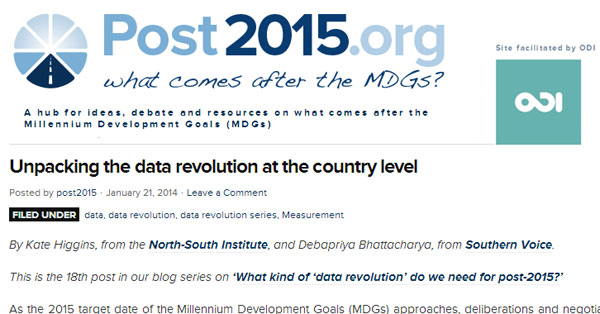Reblogged from post2015.org, published on Tuesday, 21 January 2014.
Unpacking the data revolution at the country level
By Kate Higgins, from the North-South Institute, and Debapriya Bhattacharya, from Southern Voice.
This is the 18th post in our blog series on ‘What kind of ‘data revolution’ do we need for post-2015?’
As the 2015 target date of the Millennium Development Goals (MDGs) approaches, deliberations and negotiations are intensifying on what the successor framework should be. As this blog series is demonstrating, the need for a “data revolution” is gaining considerable traction in policy circles. The revolution, it is hoped, will enhance the quality, quantity and accessibility of information available to monitor economic, social and environmental performance at the national and global levels. This should enable governments and decision makers to track development progress better and make more informed policy decisions, as well as equip people with the information and evidence they need to hold their governments to account.
To contribute to this effort, the Centre for Policy Dialogue and The North-South Institute, in association with theSouthern Voice on Post-MDG International Development Goals, are leading an initiative called “Unpacking the Data Revolution at the Country Level: An Early Examination of Candidate Post-2015 Goals, Targets and Indicators.” Seeking to connect the global call for a data revolution with country-level realities, the rationale for the initiative is three-fold.
First, given that the post-2015 framework will represent a departure from the MDGs, owing to its universal but more country-determined nature, “road-testing” the framework before the post-2015 framework is agreed inter-governmentally will be instructive.
Second, while we know that data for measuring development progress at the country level is inadequate, understanding key data gaps for measuring development progress in an expanded post- 2015 framework is warranted, particularly as discussions and decisions on the priorities and architecture of the Global Partnership on Development Data ramp up.
Third, the MDGs have been criticized for being a donor-driven, top down process that did not adequately integrate the perspective of developing countries. International discussions and decisions on the post-2015 framework need to be better informed by the priorities and needs of countries, and stakeholders at the country-level need to have opportunities to engage with global policy processes. While considerable attempts have been made to reach out and consult with people at the country level, through a number of UN-led consultation processes, analytical inputs informing the post-2015 deliberations are still overwhelming driven by think tanks, academics and analysts from the North. Engaging Southern analysts and experts in the discussion makes sense.
With this in mind, the initiative will examine:
- Data adequacy, including disaggregated data, for measuring post-2015 progress at the country level;
- Feasibility and relevance of select candidate “zero” or “global minimum standard” targets in different country contexts;
- Challenges of implementing a universal but country-relevant post-2015 framework, particularly from a measurement perspective;
- Improvements in data quality, accessibility and transparency at country level and their drivers;
- Potential of technology-enabled and non-traditional modes of data collection to support measurement of the post-2015 agenda; and
- Different stakeholders’ expectations for the “data revolution,” including likely opportunities and constraints.
To examine these issues, researchers will apply a set of candidate post-2015 goals, targets and indicators to a number of low, middle and high-income countries. Five countries have been chosen so far, and in each country, the research will be conducted by think-tanks, most of which are members of the Southern Voice network and the Think Tank Initiative. The think tanks and countries are the Centre for Policy Dialogue in Bangladesh; The North-South Institute in Canada; El Grupo Anàlisos para el Desarrollo (GRADE) in Peru; Initiative Prospective Agricole et Rurale (IPAR) in Sénégal; and Policy Research for Development (REPOA) in Tanzania.
The plans for the initiative were discussed at a recent methodology and planning workshop in New York. Supported by the United Nations Foundation and the Hewlett Foundation, the workshop was attended by statistical, research and policy experts from statistical authorities, think-tanks, UN agencies, universities, UN missions and philanthropic foundations from around the world. Participants provided detailed feedback on how to situate the initiative within the broader post-2015 and data revolution discussions, refine the methodology and maximize policy usefulness and impact.
In a blog reflecting on the workshop, Ruth Levine, Program Director of Global Development and Population at the Hewlett Foundation, argued that discussion on the data revolution has so far “remained in the comfortable zone of sweeping generalizations and principled statements.” She observed that with this initiative, we are seeking to take a “more evidence-based and less eminence-based approach … and move from global-level punditry to country-level reality, fast.”
Over coming months, that is indeed what we plan to do. We are moving quickly to ensure that the research results and policy recommendations can inform policy and inter-governmental discussions on the post-2015 framework broadly, and the data revolution specifically, throughout 2014. We will be making our methodology and approach publicly available to encourage others to refine and apply it. We will be engaging with others working on the data revolution to ensure that our work is complementary.
For the post-2015 agenda to be a success, it is clear that it needs to be a global framework that is tailored to country context and informed and owned by country-level stakeholders. The data revolution is no exception. By unpacking the data revolution at the country-level, we hope to connect the local and the global. In doing so, we look forward to identifying lessons on how we can enhance the data revolution’s success.



